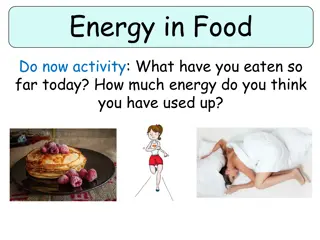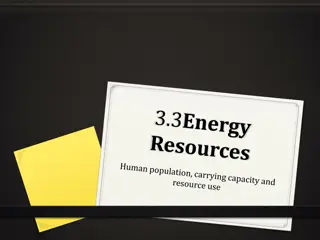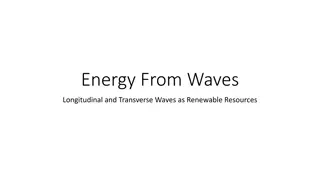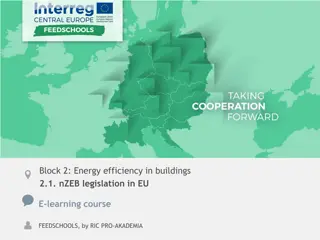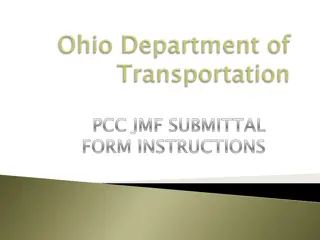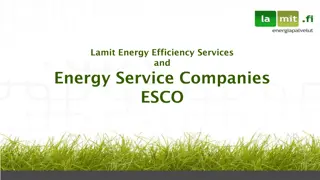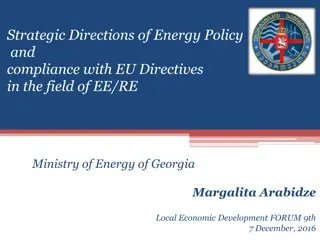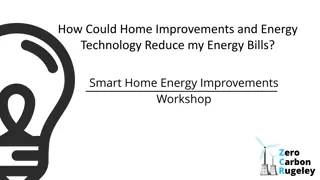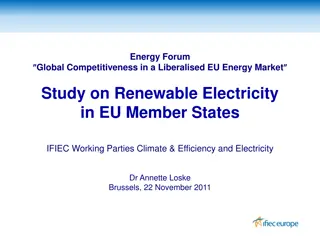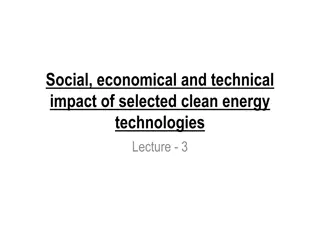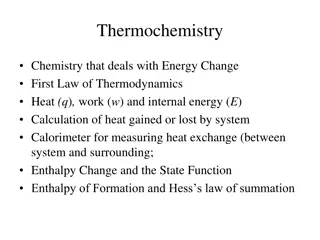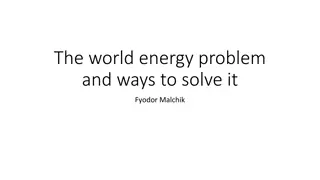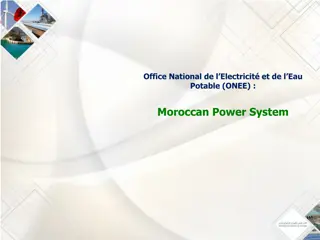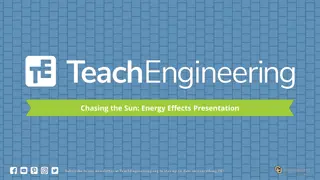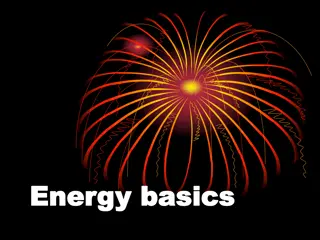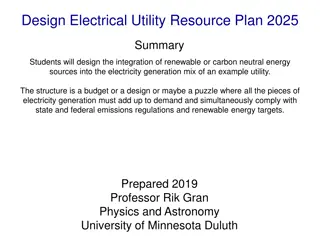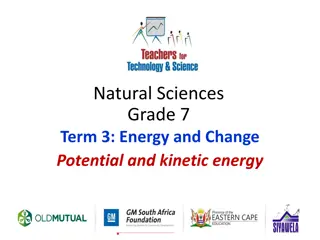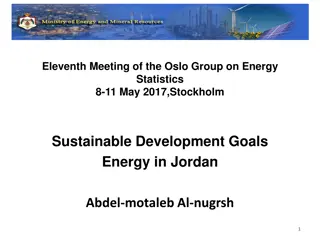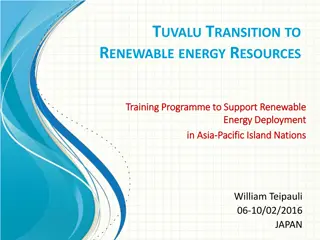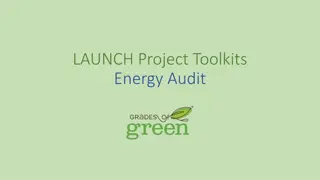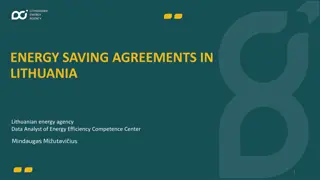Green Energy Market
Green energy also referred to as clean energy, is usually derived from natural sources that are constantly replenished. Solar energy, wind energy, hydroelectric power, biomass energy, geothermal energy, tidal energy, and wave energy are different types of renewable energy. Solar energy is the radian
6 views • 6 slides
Comprehensive Overview of Energy Balances in Germany
This material covers various aspects of energy balances in Germany, including components of energy flowcharts, renewable energy sources in the German energy balance, and total final consumption of road transport energy. It provides a detailed analysis of energy imports, domestic extraction, losses,
2 views • 10 slides
The Role of Biomass in the Energy Mix: Perspectives and Prospects
Biomass plays a crucial role in the energy transition, with significant potential for renewable energy use. Various reports highlight the importance of sustainable biomass utilization in achieving carbon neutrality. While biomass alone may not meet all energy needs, it contributes substantially to F
6 views • 25 slides
Understanding Energy: Types, Potential, and Kinetic
Dive into the world of energy with a comprehensive guide covering the definition, types, and characteristics of gravitational, potential, and kinetic energy. Explore how energy is the driving force behind all work and movement, with examples and explanations provided for each energy type. Gain insig
2 views • 24 slides
Sustainable Energy Initiatives at Local Level in Lithuania
The National Parliamentary Workshop on Energy Efficiency highlighted the importance of renewable energy development and sustainability at the local level in Lithuania. Initiatives such as the Breakthrough package and Renewable Energy Communities aim to improve energy efficiency, reduce energy povert
2 views • 12 slides
Explore Energy in Food and Daily Activities
Discover the relationship between energy in food and daily activities. Compare energy values of different foods, estimate daily energy intake, and analyze energy needs based on physical activities. Explore suitable foods for high energy requirements, and understand how to balance energy expenditure.
0 views • 14 slides
Overview of Energy Resources: Renewable and Non-Renewable
Energy resources are classified into renewable and non-renewable types, with a mix of both used worldwide. Non-renewable resources dominate global energy consumption, with fossil fuels like oil, natural gas, coal, and nuclear energy being major sources. While non-renewable sources still dominate, ef
1 views • 20 slides
Exploring Energy Stores and Transfers in Science Lessons
Dive into the fascinating world of energy stores and transfers through engaging science lessons. Recall different energy stores, common energy transfers, and create flow diagrams to illustrate energy transfers in various scenarios. Explore gravitational, elastic, magnetic, electrostatic potential en
5 views • 9 slides
Concrete Mix Design: Optimal Proportions & Aggregate Gradation
Concrete mix design is crucial for achieving the desired properties and performance of concrete. The Maximum Aggregate Density Mix Design method helps determine the best proportions for Portland Cement Concrete. Utilizing combined aggregate gradation near the maximum density line can reduce shrinkag
0 views • 34 slides
Energy Assistance Workshop Series Statewide Assessment
The Energy Assistance Workshop Series conducted a statewide assessment to understand energy burden and discuss utility energy assistance programs. The goal was to evaluate the effectiveness of mechanisms for energy assistance to prioritize households with higher energy burdens. The workshops aimed t
0 views • 26 slides
Empowering Women in Energy: SHE in Energy Africa Initiatives
SHE in Energy Africa is a non-profit organization dedicated to narrowing gender disparities, addressing skills shortages, and maximizing socio-economic benefits in the energy sector through skills development and training for girls and women. They aim to empower women with relevant knowledge and ski
4 views • 7 slides
Understanding Energy Transformation in the Natural World
Energy transformation occurs continuously in various forms around us, following the Law of Conservation of Energy. From thermal to chemical and electromagnetic energy, different types of energy are converted and utilized in everyday processes. Examples include the conversion of thermal energy to ele
0 views • 27 slides
Understanding Energy - Forms, Calculations, and Applications
Explore the concept of energy through various images, including forms of energy, kinetic versus potential energy, and calculations involving kinetic and potential energy. Learn about identifying energy states, calculating kinetic energy, and solving physics problems related to energy transfer. Dive
0 views • 27 slides
Harnessing Wave Energy: A Renewable Resource for Sustainable Power Generation
Utilizing the kinetic energy of ocean waves through transverse and longitudinal wave interactions, wave energy presents a promising renewable resource for electricity generation. This form of renewable energy, akin to wind power, involves converting the motion of waves into electrical power by deplo
0 views • 16 slides
Understanding Energy Transfers with Sankey Diagrams
Sankey diagrams are visual tools that depict energy transfers within a system, offering insights into efficiency and energy distribution. By examining the width of arrows representing energy flow, one can analyze useful and wasted energy outputs. Inefficient systems show a disproportionate amount of
1 views • 9 slides
Conducting an Effective School Energy Audit
Performing an energy audit at a school helps in understanding energy usage patterns, identifying areas of waste, and creating energy-saving action plans. The audit involves collecting data, creating switch-off lists, and filling out templates methodically to track energy consumption. It should be do
0 views • 16 slides
Understanding EU Legislation and Energy Efficiency in Buildings
This module explores the EU legislation and energy efficiency in buildings with a focus on Nearly Zero Energy Building (nZEB) concepts. It covers the importance of increasing energy efficiency in buildings in the EU, showcasing statistics on energy consumption and CO2 emissions. By improving energy
1 views • 23 slides
Optimizing Patient Care Through Skill Mix Enhancement in Healthcare Settings
Skill mix in healthcare is a crucial concept that involves balancing the variety of skills and roles in a healthcare team to achieve optimal patient care outcomes. Various perspectives and insights from healthcare professionals highlight the importance of recognizing and leveraging skill mix to enha
0 views • 14 slides
Concrete Mix Design Submission Instructions
This document provides detailed instructions for submitting a new concrete mix design or upgrading an existing mix design. It covers requirements, options for mix design upgrades, material change considerations, and steps for selecting aggregate sources and materials. The document also includes guid
0 views • 27 slides
Impact of Vehicle Mix on Crash Frequency and Severity
The supplemental presentation to NCHRP Research Report 1103 explores the influence of vehicle mix on crash frequency and severity. It highlights the project background, objectives, completed tasks, key deliverables, implementation strategies, and considerations for the Highway Safety Manual. The pro
0 views • 43 slides
Understanding Different Forms of Energy and Work in Physics
Energy in physics is the capacity to do work, and there are various forms of energy such as radiant energy, kinetic energy, gravitational potential energy, elastic potential energy, chemical potential energy, nuclear potential energy, electrical potential energy, thermal energy, and sound energy. Ea
0 views • 47 slides
Understanding the Green Deal Scheme for Energy Efficiency in the UK
The Green Deal is a national retrofit energy efficiency scheme introduced in the UK under the Energy Act 2011. It aims to provide energy efficiency measures to homes and businesses through loans collected via energy savings. Accredited advisers, installers, and providers play key roles in assessing
0 views • 17 slides
Understanding Energy Service Companies (ESCOs) and Their Role in Energy Efficiency
Energy Service Companies (ESCOs) like Lamit offer a range of energy services, from implementing energy-efficiency projects to renewable energy solutions. These companies work as long-term energy management partners, focusing on understanding customer needs, providing energy-saving solutions, and gua
2 views • 18 slides
Overview of Energy Policy and Compliance with EU Directives in Georgia
Ministry of Energy in Georgia focuses on strategic directions for energy policy in alignment with EU directives. The Energy Strategy, Covenant of Mayors, and National Energy Efficiency Action Plan are key initiatives promoting energy efficiency and renewable energy. Projects include consultancy on s
0 views • 10 slides
Exploring Home Energy Improvements and Smart Technology for Energy Efficiency
Discover how home improvements and energy technology can significantly reduce energy bills. Join the Smart Home Energy Improvements Workshop in Zero Carbon Rugeley to explore approaches for sustainable energy production and usage at home. Learn about retrofitting, smart energy systems, and meet char
0 views • 20 slides
Analysis of Renewable Energy Policies in the Liberalised EU Energy Market
This study examines the global competitiveness of the energy forum in a liberalised EU energy market, focusing on renewable electricity in EU member states. It delves into the energy balance, political context regarding European climate targets, industry involvement, and the financial context of ren
0 views • 16 slides
Social, Economical, and Technical Impact of Clean Energy Technologies
This course covers the management of micro-level clean energy projects, emphasizing the social, economic, and technical impacts of selected clean energy technologies. It discusses project organization, tools, project life cycle, financial analysis, barriers, capacity building, and more. It delves in
0 views • 32 slides
Basics of Thermochemistry and Energy Changes in Chemistry
Thermochemistry in chemistry involves energy change, the First Law of Thermodynamics, and concepts like heat, work, and internal energy. It explores calculations of heat exchange using calorimeters, Enthalpy Change, Enthalpy of Formation, and more. Energy basics cover the importance of energy change
0 views • 53 slides
Sustainable Energy Solutions for the Future
The world is facing an energy crisis, and it is crucial to consider alternative sources of energy for a sustainable future. Options such as wind power, sea power, nuclear energy, and solar power are being explored, each with its advantages and disadvantages. Decision-makers must weigh these factors
0 views • 10 slides
Moroccan Power System: Challenges and Opportunities in Renewable Energy Development
The Office National de l'Electricité et de l'Eau Potable (ONEE) in Morocco is experiencing a significant growth in electricity demand. The country has diversified power generation capabilities and a strong focus on renewable energy projects. With integrated programs initiated by the government and
0 views • 14 slides
Understanding Solar Energy and its Impact
Explore the world of solar energy and its effects on Earth and daily life. Discover the various types of energy and their significance, including electricity, light, heat, and solar energy. Uncover how solar energy influences us and the planet, providing a combination of heat and light energy from t
0 views • 12 slides
Understanding Energy Basics: Temperature, Heat, and Transfer
Explore the fundamental concepts of energy, including temperature, heat, and energy transfer. Learn how temperature differs from heat, how they are measured, and the relationship between thermal energy and water volume. Discover the role of chemical energy and sound energy, and how energy is transfo
0 views • 12 slides
Enhancing Energy Efficiency in Saudi Arabia: SEEC's Impactful Initiatives
The Saudi Energy Efficiency Center (SEEC) plays a crucial role in improving energy efficiency in Saudi Arabia through strategic programs and initiatives. Established in 2010, SEEC focuses on sectors like transportation, industry, and buildings, with a goal to reduce energy consumption and promote aw
0 views • 29 slides
Understanding Elastic Potential Energy and Energy Conservation Principles
Elastic potential energy is stored in elastic bodies like springs and is vital in understanding energy conservation principles. This energy can be calculated using the work done by an ideal spring on a block. By applying elastic potential energy concepts, one can analyze scenarios where a spring sys
0 views • 9 slides
Integrating Renewable Energy Sources for Minnesota Power Utility: A 2025 Plan
Students will design the integration of renewable or carbon-neutral energy sources into the electricity generation mix of Minnesota Power Utility to align with state and federal regulations. The plan involves transitioning from coal to hydro, wind, solar, natural gas, and purchased sources, with a f
0 views • 10 slides
Understanding Energy: Potential and Kinetic Forms in Grade 7 Natural Sciences
Energy in various forms is explored in Grade 7 Natural Sciences, with a focus on potential and kinetic energy. Energy is the ability to do work and exists in different types like heat, chemical, electromagnetic, nuclear, and mechanical. The sun serves as a primary energy source. Potential energy is
0 views • 11 slides
Energy Strategy and Challenges in Jordan: Towards Sustainable Development
The Eleventh Meeting of the Oslo Group on Energy Statistics discussed the energy sector in Jordan, highlighting challenges such as population growth, energy demand, and high energy costs. Jordan aims to diversify energy resources, reduce oil dependency, and enhance environmental protection through i
0 views • 34 slides
Tuvalu Renewable Energy Transition Programme
Tuvalu is transitioning to renewable energy sources to support sustainable energy deployment in the Asia-Pacific region. With a focus on solar PV, wind, biodiesel, and energy efficiency, the government aims to achieve 100% renewable energy generation by 2020. The implementation strategy includes a m
1 views • 14 slides
Understanding Energy Efficiency and Reducing Fossil Fuel Dependency
Energy audits reveal the significance of fossil fuels in our energy mix despite renewable energy investments. Standby energy consumption contributes to household bills, but simple habits like unplugging unused appliances and switching to LEDs can make a difference in reducing energy consumption and
0 views • 4 slides
Energy Saving Agreements in Lithuania: Legal Framework and Targets
Lithuania's energy saving agreements are guided by a comprehensive legal framework including laws on energy efficiency and methodologies for energy audits. The country has set ambitious energy efficiency targets for 2030, focusing on sectors like building renovation, industry, and household applianc
0 views • 14 slides





